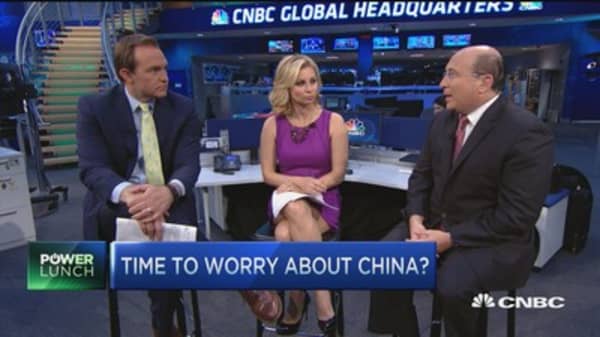After having doubled in the last 12 months, Shanghai shares are still up 40 percent year-to-date, but the next few weeks could prove critical in determining whether last week's drop, the worst week in China since 2008, is a "healthy" correction or the start of something big … and worrisome.
The liberalization of the Chinese market; the prospect of Chinese shares being added to the MSCI world index (which would force money managers to add to their weightings of Chinese stocks to mirror their benchmark); hot money flooding into, and out of, Shanghai, Hong Kong, and Shenzhen, have all contributed to the wild moves in the market of the world's second largest economy.
Read More Asian equities cheer Greece's new reform deal
Citing China's many market restrictions, MSCI has delayed adding Chinese stocks to its index, which may have been behind some, or all, of last week's pullback. But the Chinese economy, recently the presumed envy of the world, has lost some of its luster, of late.
Of course, market bulls say that China has mastered the art of managing its economy and markets. Its command and control leadership can, at will, make the economy roar and stocks soar. It is true that the Chinese government, like any other government in the world, can pull various levers to boost asset prices, stimulate growth and encourage overseas investors to join the party.
This, of course, is the exact same argument that the bulls used when saying Japan's market was a superior version of western bourses, thanks to the strict discipline of Japan's central bank; the interlocking ownership of Japanese corporations (known as keirestu), through which the buying of related company shares drove Japanese stock prices ever higher; and the superiority of Japan's mercantile manufacturing economy.
Then, on the last day of 1989, at the very height of optimism over Japan's rising sun market, the sun set rather abruptly, with the Nikkei sinking by 70 percent over the next decade. It remains 50 percent below its all-time high of nearly 40,000.
China looks pretty much the same to me. Its manufacturing prowess has been overstated. Its ability to manipulate and stimulate its economy may have run its course. Its labor-cost advantages have narrowed markedly and its government has been less than friendly, in many ways, to firms wishing to expand their operations on the mainland.
Read More China stock rout fuels easing expectations
As was the case with Japanese stocks in 1989, U.S. Internet stocks in 2000, or credit instruments in 2007, valuations in China are stretched. There is a mania for stocks among individual Chinese investors that rivals Japan in the late '80s, or the U.S. in the late '90s.
Individual investors in China are said to be opening a million brokerage accounts a week, many choosing to buy stocks on margin, or borrowed money, very frequently the sign of a major market top. It's true they have precious few investment alternatives other than stocks, but some U.S. bears say that's a poor reason to buy a seemingly overvalued S&P, while recommending purchase of Shanghai shares.
It's easy to be wrong about China, given its vast foreign exchange reserves and general disdain for failures in a controlled market. However, China's debt-to-GDP ratio, a key metric that has turned many an investor bearish on U.S. stocks, is 282 percent, more than double that of the U.S. and even larger than Japan's hefty burden.
Read MoreChina market down, not out: UBS
We may worry about Washington, tremble about Tokyo, or even go apoplectic about Athens. I would argue that more importantly, this is hardly the time to be chill about China.




